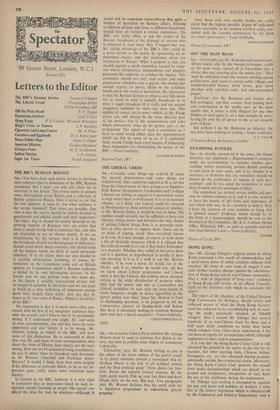Letters to the Editor
The BBC's Russian Service Leonard Schapiro The Liberal Creed Christopher Hollis Philip Goodhart, MP Off the Main Road T. V. Taylor Examining Justices Lord Tucker Hong Kong P. S. Cassidy, Meredith Whittaker King's Cross to Easton J. P. Bardsley Cigarettes and Lung Cancer Dr. A. Piney Cavaliers and Eggheads D. F. Baker Lace Dame Edith's Ban Laura S. Deane Austrian Mission Gordon Shepherd Georges Four M. G. Godlonton Indian Mutiny J. D. Jenkins
Light for Taper Frank Singleton.
THE BBC's RUSSIAN SERVICE SIR,—You have done such public service in throwing your columns open to discussion of the BBC Russian broadcasts that I hope you will still allow me to intervene in the debate. The service exists to present news, information about Britain and a reflection of British opinion to Russia. Now it seems to me that the real question at issue is: for what audience is the service intended? Two views are possible. One view is that the service should be mainly directed to government and official circles and their supporters. The other, that it should be mainly directed to the growing number of Russians who are aware that there is much wrong with Communist rule, and who are beginning to say so almost openly. If we are broadcasting for the former, then it is right that the broadcasts should use the language of diplomacy, should avoid direct sharp criticism, and should keep off the subjects which are likely to cause particular irritation. If to the latter, then our aim should be to provide information, including, of course, in- formation on the Communist orbit and on British opinion on Communism which a Russian audience is denied by its own information services. In the former case we can perhaps hope that some day in the future a suitably emasculated service will no longer be jammed. In the latter case we can hope to build up a close following of supporters among those who, largely silent today, may one day be heard as the true voice of Russia. Which is the policy of the BBC?
My impression is that it is much more often con- cerned with the first of my imaginary audiences than with the second, and I believe this to be profoundly wrong. If I understand you aright, Sir, and some of your correspondents, you and they have the same impression and also believe it to be wrong. Mr. Gretton, writing on behalf of the BBC, will have none of this distinction. He is concerned to show that you, Sir, and those of your correspondents who share the views of Pharos, have simply got the facts wrong. How can we be accused of being conciliatory, he says in effect, when we broadcast such fire-eaters as Sir Winston Churchill and Professor Seton- Watson? It would, I think, have been more helpful if the difference of principle which, so far as my im- pression goes, really exists were ventilated more frankly.
In fairness to the BBC, however, it is only right to remember that an impression based on such oc- casional sample listening as people like myself can afford the time for may be mistaken—although it
would still be somewhat extraordinary that quite a number of specialists on Russian affairs, listening at different periods and times to different broadcasts, should have all formed a similar impression. The BBC very fairly offers to put the scripts of the Russian broadcasts at the disposal of anyone who is prepared to read them. May l' suggest that you, Sir, taking advantage of the BBC's offer, could do a great service to the public by sponsoring an in- dependent inquiry into the uneasiness about our broadcasts to Russia? What I propose is that you should appoint a small committee, headed by some- one whose competence, independence and integrity guarantee his authority to conduct the inquiry. This committee should not only read scripts and study programme schedules over a period, but should also consult experts on Soviet affairs in the academic world and in the world of journalism. My impression is that the Russian Service as often as not falls down not so much in what-it actually broadcasts as in what it might broadcast (if it really had my second imaginary audience in view) but does not. This applies, of course, not to news—which, as Mr. Frank points out, will always be the most effective part of the service—but to the commentaries and talks which presumably make up the greater part of the programme. The report of such a committee as I have in mind would either allay the apprehensions which are felt by some of us or, if it confirmed them, would, I hope, have every chance of influencing those responsible for formulating the policy of the BBC—Yours faithfully,






























 Previous page
Previous page